“For a kid, having a Halloween birthday really makes you feel unique, and being a red-head, you are unique…From the time I could think about who I was, I felt that I was not like everyone else.”
Only Halloween could birth one of history’s most successful red-headed writers.
With a knack for quirky, sub-culture subjects, Susan Orlean has embraced her Halloween origins and written her way to the top of the literary food chain.
Born and raised in a small suburb of Cleveland, Orlean, who never made it past 5’2, has lived a life of grand proportions.
After avoiding the once inevitable trip to law school, Orlean pursued her passion for long form journalism. Following early stints at publications in Portland and Boston, she moved to New York and everything changed.
Since 1992, Orlean has been a staff writer for the New Yorker magazine, where she’s produced a wide range of features and built 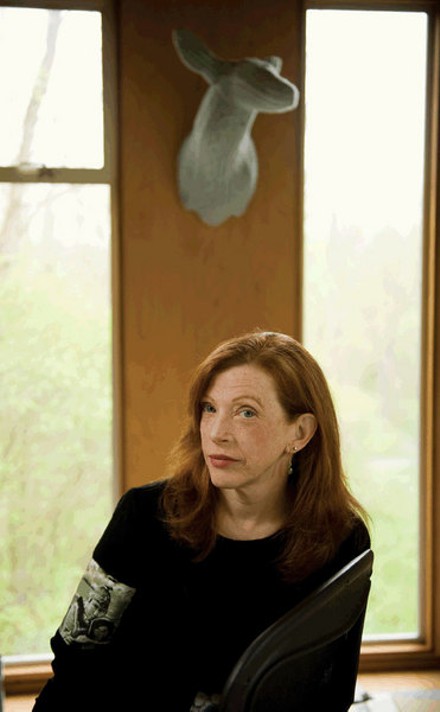 a dedicated readership. Her stories have ranged from a New York cab driver who doubles as an African King, a profile of the American male at age 10, and a man obsessed with painting colorful patterns in Wal-Mart. Throughout the years, Orlean’s “brand” has congealed around these types of story selections. Her niche is transforming the obscure, and potentially mundane, into compelling narratives.
a dedicated readership. Her stories have ranged from a New York cab driver who doubles as an African King, a profile of the American male at age 10, and a man obsessed with painting colorful patterns in Wal-Mart. Throughout the years, Orlean’s “brand” has congealed around these types of story selections. Her niche is transforming the obscure, and potentially mundane, into compelling narratives.
One of her former employer’s, The Willamette Week, may have said it best when they described her as, “a tiny woman who has the power to see big things in everything.”
Magazine features are just the beginning of Orlean’s literary work. She’s also authored several best-selling books. Most notably, The Orchid Thief, a book about an obsessive Orchid lover named John Laroche. The book was a smash and provided the basis for the bizarre, Oscar- winning film, Adaptation. Orlean was portrayed by Meryl Streep, a fact that will, gladly, follow her for the rest of her life.
Most recently, in 2011, Orlean released Rin Tin Tin: The Life and the Legend, a complete history of the famous dog’s television and film career. Orlean spent 10 years, on and off, researching and writing the book. It’s a fascinating look into the tumultuous, but overall triumphant, life of Rin Tin Tin. It also explores the extreme human connections with canines. Completing a book of such size and scope exemplifies some of Orlean’s strongest attributes: focus, passion, and never ending curiosity.
Today, Orlean continues her work at The New Yorker, provides daily entertainment for hundreds of thousands of twitter followers, and remains continually curious.
There is much I WANNA KNOW about one of America’s finest writers.
From the decline of the book review, to obsessive characters, to Truman Capote, to the impact of being born on Halloween, we cover it all.
. . .
RK: Congrats on your latest New Yorker piece, “Walart.” Every time you write a story, people are always curious where you found the subject. So, how did you come across Brendan O’Connell and his Wal-Mart paintings?
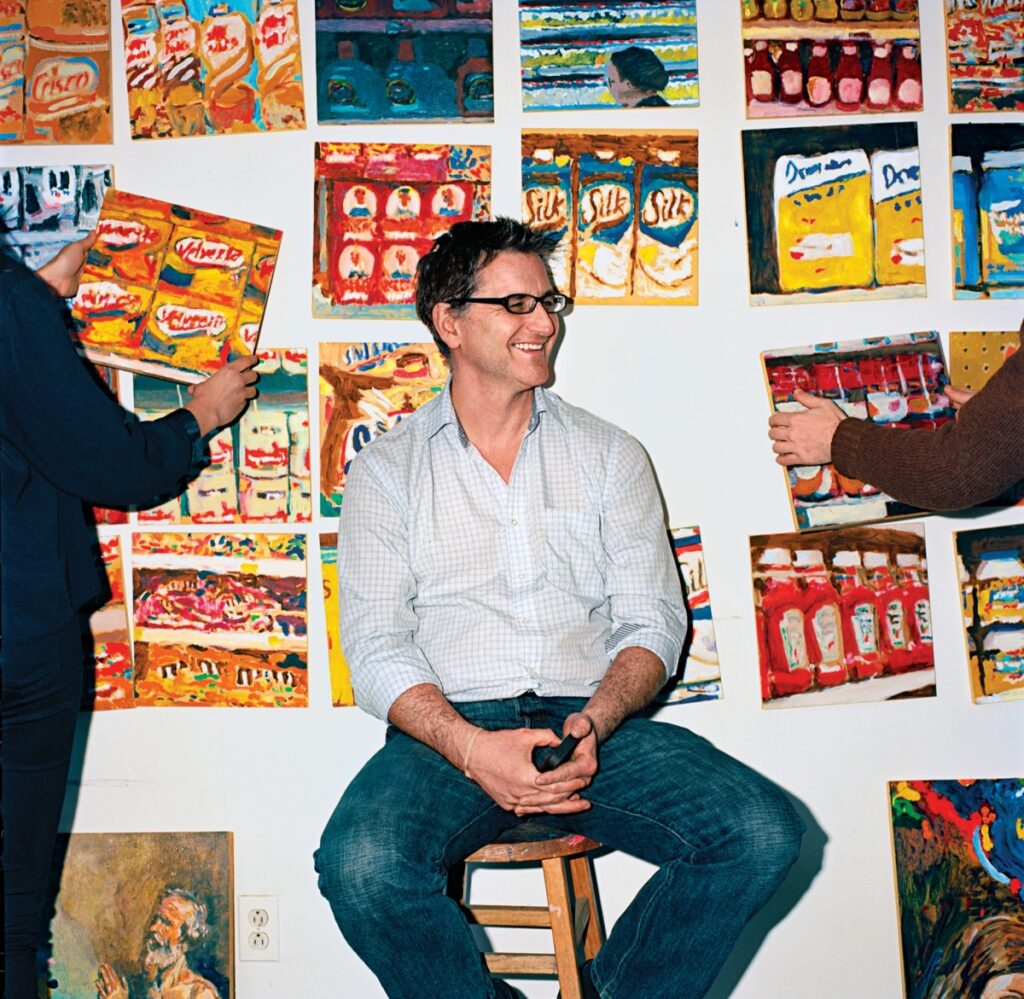 SO: It was a little unusual for me because generally I don’t know the people I write about before I write about them. In this case, I knew Brendan and one day as he was telling what he was working on I just said, “Oh my God, this is a great story.” Somebody should write about it. At first I was thinking who should he suggest this to and suddenly I thought, “Why can’t I do it?” Even though I knew him already there was no question about objectivity being an issue because it’s not that kind of story. So, the minute that dawned on me that I was clear to write about it without any sort of ethical issue. I just said, “I want to do this.”
SO: It was a little unusual for me because generally I don’t know the people I write about before I write about them. In this case, I knew Brendan and one day as he was telling what he was working on I just said, “Oh my God, this is a great story.” Somebody should write about it. At first I was thinking who should he suggest this to and suddenly I thought, “Why can’t I do it?” Even though I knew him already there was no question about objectivity being an issue because it’s not that kind of story. So, the minute that dawned on me that I was clear to write about it without any sort of ethical issue. I just said, “I want to do this.”
It struck me as such an unlikely, interesting, odd, relationship with Wal-Mart. It was interesting how he had navigated from a persona non grata in the stores, to being embraced by the company, which was so interesting. And, I really liked the art, so it was very easy for me to think, “Gee I’d like to write about it.”
RK: Brendan O’Connell represents a character with an obsession, an unstoppable passion. I’ve heard you talk before about why these stories seem to resonate and provide a compelling narrative. From your experience, is it fair to say that obsession is at the core of most people’s stories?
SO: Yeah, I think that’s pretty accurate. It’s not the only organizing principle that exists, but it’s certainly the case that a very singular devotion to something makes for an interesting framework for writing about something. It also allows you to see people in an interesting and dramatic way, when they really have a fanatic consistency to what they care about.
RK: Your latest book, “Rin Tin Tin” also profiled some very obsessive people, like the dog’s owner Lee Duncan. His journal became a primary source, but he clearly embellished a lot of stuff, and you acknowledge that in the book. Do you find it difficult to trust a source when they seem so obsessed about something?
SO: I think you have to factor that in. In many cases people with that kind of devotion no longer have objectivity. By definition they no longer have objectivity, the subject matter has become so central to who they are and what they care about. You have to take that into account. I think journalistically it’s really interesting to maintain some distance from it, and appreciate how un-objective they are. That’s of course the challenge about writing about obsessive people, to connect with them enough to have a sympathy for their obsession, and at the same time keep that distance from it so that you can observe it with some distance. That’s what makes it interesting. That’s a good challenge.
RK: There’s this great scene in “Rin Tin Tin” where you go looking for screenwriter, Jane Murfin’s, house. You arrive at the house and are completely unimpressed by the place, you thought it was going to be a mansion. Eventually, you discover you were standing in her dog’s house, and her mansion was up the street. Is it moments like these that get you excited to write your story?
SO: Yeah, definitely. You feel that little tingle of thinking, “Oh my god, I scored.”. It’s funny, that was something where on one hand I was feeling like an idiot because I was thinking, “This isn’t what I expected it to be, it’s not very glamorous.” I was a bit down and then it was hilarious to have the whole thing turn on itself and become far more wonderful. When you’re writing I think you do get that feeling that it’s great and a keeper. What a wonderful feeling that is.
RK: In the back of “Rin Tin Tin” there are discussion questions for book clubs. As an author, is having a group of people sitting around discussing your work the ultimate honor?
SO: Completely. As many times as it might happen, it’s thrilling. I know that many people have read my books and I still find it absolutely thrilling. A book club having a discussion and debate, and people really arguing in a passionate way about their perspective of a book, makes you appreciate that the book is its own creation. It’s become an entity unto itself. That’s really thrilling. It’s like seeing a kid grow up. Your baby is now a doctor, or a grown person, and that’s remarkable. I don’t think you’d ever get tired of it. It’s so gratifying and never gets old.
RK: When you’re writing, the lede is obviously so important, but often the hardest part. “Rin Tin Tin” had another great lede: “He believed the dog was immortal.” It seemed to capture the essence of the book in six words. How many drafts did you go through to come up with that lede?
SO: A billion. Literally. That was not an easy lede, I tell you. I revised it repeatedly because the challenge of the book was that is was such a sweeping time period, which was huge and very tricky. At the same time, I didn’t want to begin just by saying, “Rin Tin Tin was born” I really felt like I had to do something that got me more emotionally into the book, rather than chronologically. I worked on that for an extremely long time, almost to the point where I worked on it longer than any lede I can think of.
When it finally worked it was thrilling. I thought, ‘Wow, I’ve got it right.”
RK: How do you know when you’ve got it right?
SO: The minute you write it, it feels like it was the way it was always supposed to be. It’s intuitive, that feeling that it’s the right lede. There might have been twenty different ways that book could have begun, but there’s no question when I wrote that I knew it was it. That was after many false starts. I certainly went around and around.
RK: I’ve heard it said that some literary judges can assess the quality of a book, or writer, in the first eight words. Do you think there’s some truth to that statement?
SO: I would hesitate a little, only because even though I believe that lede’s are very important, there are books that start very quietly and very simply. I don’t think there’s ever been a great book that had a bad lede, but there are lede’s that are quieter than others. And, they may not immediately strike you with the full impact.
RK: You used to be a music critic at the Willamette Week. You stopped because you loved music and didn’t want to spend all that time tearing it down, or building it up. Should the same logic apply to the culture of criticism around literature?
SO: That’s a tough thing. You experience books in so many different ways. I think book reviewing has declined as an intellectual form unfortunately. I often read book reviews that are more just telling me what the book is about, and it’s very annoying and tedious, because all it says is “This happens, and then this happens.” I’m not really sure if it’s just a synopsis so I can discuss it at a dinner party, and I don’t have to read it. I don’t know what they accomplish.
I don’t think it takes away the pleasure of reading. And, I’m not a big reader of book reviews. It’s not a form I enjoy all that much. I love talking about books, but after I’ve read them, so I can be a part of the conversation.
RK: But, do you think that the culture of criticism is unjustly tearing down people’s creative work? Do we need it?
SO: I think that a culture that encourages thinking and talking about literature is wonderful. I think the process of saying this is lousy, don’t read it, or this is good, read it, is different than encouraging conversation. Yet, I also think that we are besieged by a huge number of books being released all the time, so it’s a consumer service to say, there are 100 books that came out this week and these are good and these are not as good. You need really good smart critics to make that meaningful, of course.
RK: You’ve received great access to fascinating sources over the years. What do you make of Janet Malcolm‘s statement that, “Every journalist who is not too stupid or full of himself to notice what is going on knows that what he does is morally indefensible”?
SO: I think that it is a brilliant, and perhaps exaggerated, but important revelation. I think she was identifying something really important about the relationship between a journalist and subject. While you may not look at it as cynically as she does, her point is accurate. You need to acknowledge the reality of the relationships, which is often mutually exploitative. That is the nature of the business. As a writer, and frankly as a reader, you need to be sure you’re paying attention to the moral implications of what you do. I happen to think it’s a significant, and largely accurate thing that got a lot of people riled up.
RK: Do you have a method while reporting to ensure that you don’t cheat your source, or at least provide a more mutually beneficial outcome?
SO: I think about it all the time because I so often write about people who aren’t selling anything. Put aside my recent Walart story, and I’m writing about people who have no benefit by being my subject. I’m very humbled by it, and I think about it all the time. I think it’s important to have some perspective on the experience of being a writer, and the experience of having people read your work, and what it means in terms of responsibility. So, I just think that statement is a really important one.
RK: Do you keep in touch with any of your sources? And, do you have a personal policy about the post-story relationship?
SO: I don’t have any kind of policy. The reality is that most of the people I write about, once I’m done writing about them, their lives and mine have no overlap. There isn’t any natural way we would remain in touch. If I have occasion to catch up with them I’m thrilled. But they certainly have no obligation to keep in touch with me.
There are people I’ve written about and never heard from, whether they hated it or loved it. That’s O.K. They don’t need to tell me how they liked the story. It’s just reality. They’re most often people I didn’t have contact before we became connected through the experience of me writing about them. When I’m done they go back to their life, and I go back to mine. It’s natural.
RK: What did you make of the Wall Street Journal article that provides evidence of erroneous information in Truman Capote’s “In Cold Blood”?
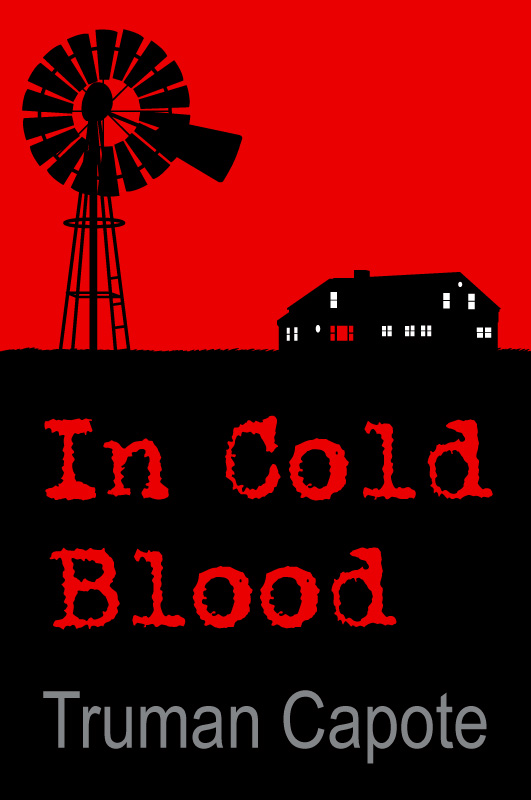 SO: I was bummed. Is it shocking? No. I’m still not sure I understand what the reality is. It’s funny because I was just having a conversation with someone who said that Joseph Mitchell, who I idolize, composited a lot of his characters and invented some characters. I was so depressed. I just thought, “Oh no, are you kidding?” There was a thing in Slate about this whole phenomenon. I was distressed by what seems like an endless stream of people these days being accused of impropriety. There is a long tradition as eminent as Truman Capote, and H.L. Mencken, and you think it’s terrible.
SO: I was bummed. Is it shocking? No. I’m still not sure I understand what the reality is. It’s funny because I was just having a conversation with someone who said that Joseph Mitchell, who I idolize, composited a lot of his characters and invented some characters. I was so depressed. I just thought, “Oh no, are you kidding?” There was a thing in Slate about this whole phenomenon. I was distressed by what seems like an endless stream of people these days being accused of impropriety. There is a long tradition as eminent as Truman Capote, and H.L. Mencken, and you think it’s terrible.
It doesn’t change my feeling about what I think is right, at all. In the case of those particular people, my only possible way of trying to make it less disappointing is to think they were working in a newer world of fiction vs. non-fiction. I still think it’s not the right thing to do, even if Joseph Mitchell and Capote did it.
The thing with Capote is that he wrote a lot fiction, and he came to his writing not as a newspaper man, the way A.J. Liebling did. So for them I’m more disappointed.
It still does affect my sense of Capote and his book, but I give it more latitude because he was someone coming from the world of fiction.
RK: More recent high-profile cases of fabrication (i.e. Jonah Lehrer or Stephen Glass) tend to turn up an argument about too much pressure and expectation to perform at that high level. Do you think too much is asked of young journalists at top-tier publications?
SO: No, I don’t. I think the temptation to achieve more is greater. In Joseph Mitchell’s day, writer’s didn’t become wealthy and have T.V. shows. I think what exists now is a little bit more in terms of temptation. I suppose you could say people are under more financial pressure, but I don’t know if I believe that. Those other people lived through the depression. Those people had plenty of pressure, and in many instances were married with children. If you look at the list of many of those accused of fabricating stories today, many of them are single men. It’s the incredible temptation of being a celebrity that is a part of what goes on now. That didn’t really go on back then.
RK: Well, let’s just hope the next big scandal doesn’t involve Joan Didion.
SO: Oh, God. Actually that would be devastating for me. I would be done.
RK: You’re known for these quirky, “slice of life” stories. In most, if not all, the stories you rarely put yourself in personal danger while reporting. How much would you be willing to sacrifice to tell a story?
SO: Well that’s an interesting question because there was a point when I really wanted to go into some relatively dangerous places and I was discouraged strongly by some people at the magazine who just felt that I didn’t quite appreciate how dangerous it really was.
So, I’ve been in situations that weren’t comfortable and I’m very willing to be uncomfortable, if that makes sense. I’m a mother, I have a kid, I feel like I look at personal danger a little different now that I’ve got a person that depends on me. But, I don’t look for stories with the idea that I want to be comfy, or want to be somewhere that’s fun and pleasant. Actually, I’m frequently not.
RK: You grew up in Shaker Heights, Ohio. A large number of successful creative types emerged from that small suburb (i.e. Paul Newman, Michael Symon, Molly Shannon). What do you think it is about Shaker Heights that produces so many artists?
SO: Well, it is a community that really places a huge premium on education and it’s also unusual in that it’s both an affluent and a diverse one, which you rarely see in the world. It doesn’t surprise me because there is this atmosphere that’s intellectual, and also, as I said, a surprising amount of diversity that I think always fosters creativity.
RK: Do you think being born on Halloween impacted your life in any meaningful way?
SO: Absolutely. It’s interesting you ask that. There were two things: Being born on Halloween and being a red-head. Before I had a sense of myself I thought I was special, not in some obnoxious way. For a kid, having a Halloween birthday really makes you feel unique and also being a red-head you are unique. People respond to you as sort of special and not just like everybody else. There were times when I didn’t like that, when I wanted to like everyone else, but I think from the time I could think about who I was I felt that I was not like everyone else.
RK: Wait, so did having a Halloween party ruin your birthday or double the party?
SO: It was an extra special thing because you’d have a party and then go trick-or-treating. I lived in a neighbourhood where everyone knew it was my birthday so at every house I would usually get double candy. So, from the get go it made me feel special. It still does. It’s not like having a birthday on Christmas where everyone goes, “This is sad.” This was a wonderful thing. I think those things add up in your life and sense of your self. As silly as it seems, I think it matters.
RK: That’s interesting you mentioned being a red-head because my next question was, do you think you’re the most successful red-head writer ever?
SO: (laughs) Well, I don’t know about that and I would hesitate to make that assumption.
RK: Do you still listen to a lot of African music?
SO: Yes. I absolutely love it and recently just discovered to my great excitement that on YouTube you can find a bunch of videos of some of these musicians who have never come here or passed away. That was a real thrill.
My favorite artists come from the Congo, and the musician who I love is named Franco. He’s just amazing. There are some videos of him performing on YouTube, which was extremely exciting for me.
RK: You’re a huge animal lover. But there really is something special about the dog. Are your dogs your favorite animals?
SO: I love dogs and I think our relationship with them is the most intimate. If I had to pick, sure. If I could only have one animal I guess it would be a dog, but I have to hesitate because I have cats now. I certainly never thought I’d be a big fan, but I actually really love my cats.
There are all sorts of animals I love but don’t have, like a horse, that I think I’d be attached to. I guess, it’s safe to say that I just love animals.
RK: You get paid to observe intently. You must have developed some strong pet peeves.
SO: Littering and bad grammar. I’m very dorky that way.
It’s funny because my husband and I joke about it all the time that if I was on a first date and they littered, it would be a deal breaker.
RK: I don’t want you to get in trouble for insider trading, but what advice can you give me about how to win the New Yorker Cartoon caption contest?
SO: (laughs) You will not be the first person to have asked me that. I wish I could tell you that so I could get a kickback from you. I have no idea. I’m sorry.
Roger Ebert did it every week for years and he finally won. That’s just my way of saying that the fix is not in.
FOR MORE INFORMATION ON SUSAN ORLEAN:
1) Go to www.susanorlean.com
2) Follow her on twitter: @susanorlean
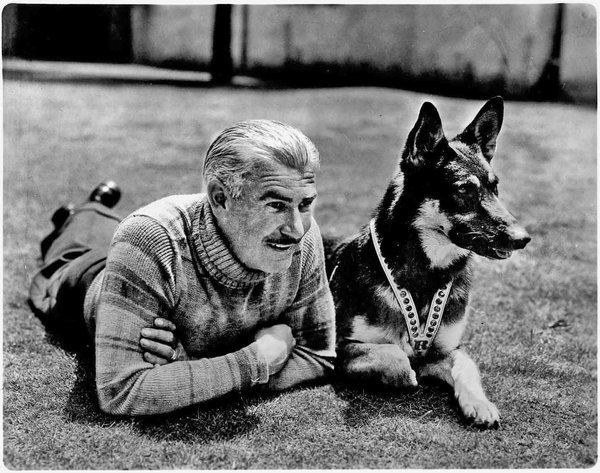
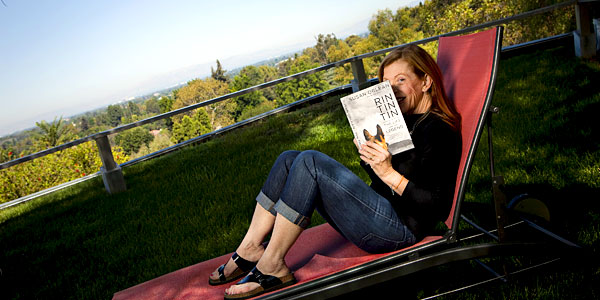
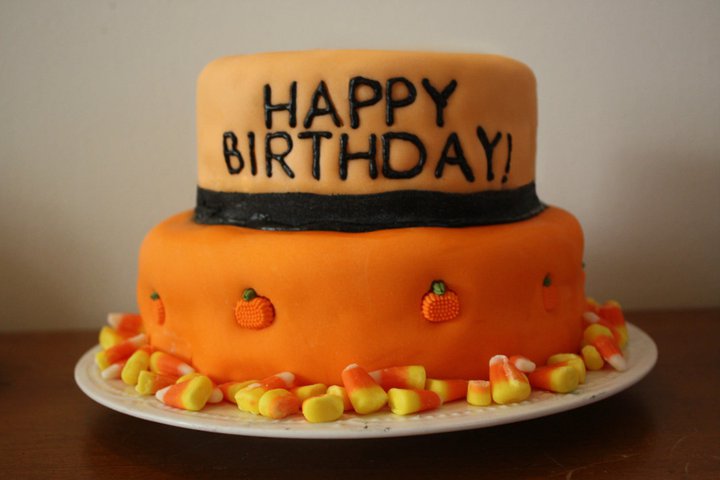
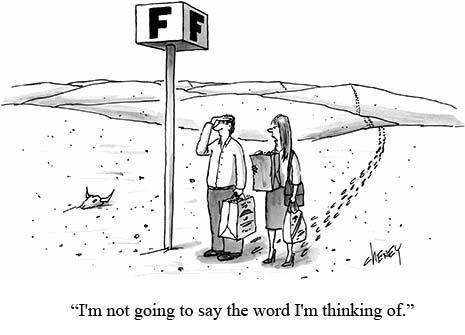
great interview! Never read her, but I will now.